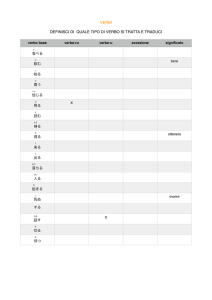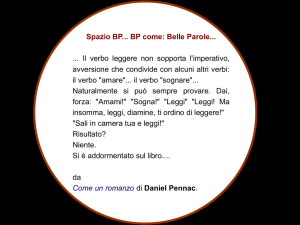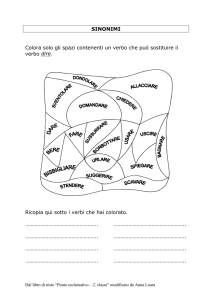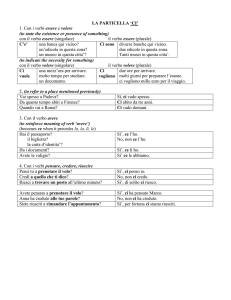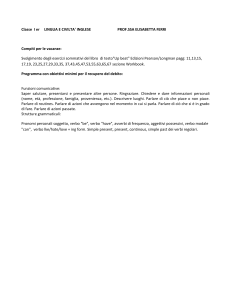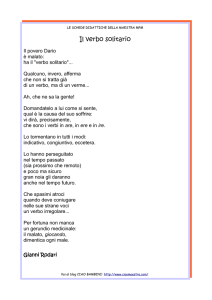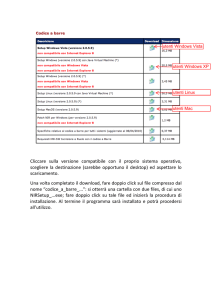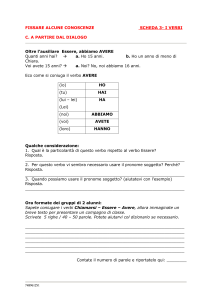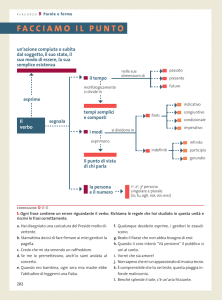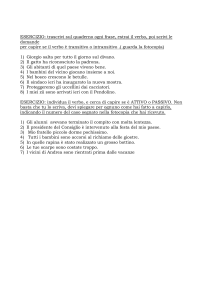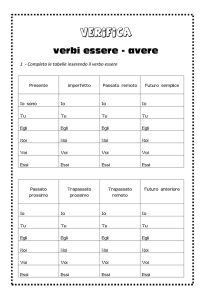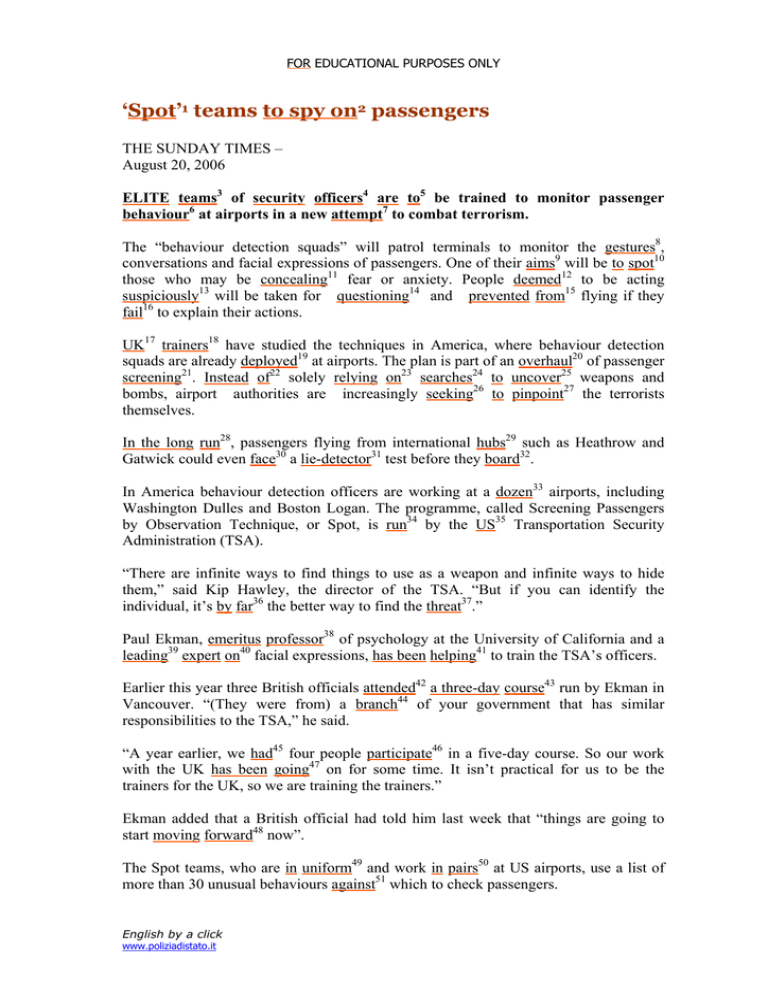
FOR EDUCATIONAL PURPOSES ONLY
‘Spot’1 teams to spy on2 passengers
THE SUNDAY TIMES –
August 20, 2006
ELITE teams3 of security officers4 are to5 be trained to monitor passenger
behaviour6 at airports in a new attempt7 to combat terrorism.
The “behaviour detection squads” will patrol terminals to monitor the gestures8,
conversations and facial expressions of passengers. One of their aims9 will be to spot10
those who may be concealing11 fear or anxiety. People deemed12 to be acting
suspiciously13 will be taken for questioning14 and prevented from15 flying if they
fail16 to explain their actions.
UK17 trainers18 have studied the techniques in America, where behaviour detection
squads are already deployed19 at airports. The plan is part of an overhaul20 of passenger
screening21. Instead of22 solely relying on23 searches24 to uncover25 weapons and
bombs, airport authorities are increasingly seeking26 to pinpoint27 the terrorists
themselves.
In the long run28, passengers flying from international hubs29 such as Heathrow and
Gatwick could even face30 a lie-detector31 test before they board32.
In America behaviour detection officers are working at a dozen33 airports, including
Washington Dulles and Boston Logan. The programme, called Screening Passengers
by Observation Technique, or Spot, is run34 by the US35 Transportation Security
Administration (TSA).
“There are infinite ways to find things to use as a weapon and infinite ways to hide
them,” said Kip Hawley, the director of the TSA. “But if you can identify the
individual, it’s by far36 the better way to find the threat37.”
Paul Ekman, emeritus professor38 of psychology at the University of California and a
leading39 expert on40 facial expressions, has been helping41 to train the TSA’s officers.
Earlier this year three British officials attended42 a three-day course43 run by Ekman in
Vancouver. “(They were from) a branch44 of your government that has similar
responsibilities to the TSA,” he said.
“A year earlier, we had45 four people participate46 in a five-day course. So our work
with the UK has been going47 on for some time. It isn’t practical for us to be the
trainers for the UK, so we are training the trainers.”
Ekman added that a British official had told him last week that “things are going to
start moving forward48 now”.
The Spot teams, who are in uniform49 and work in pairs50 at US airports, use a list of
more than 30 unusual behaviours against51 which to check passengers.
English by a click
www.poliziadistato.it
FOR EDUCATIONAL PURPOSES ONLY
Some things they look for are obvious, such as a person wearing a coat on a hot day or
pacing around52, but there are more subtle signs.
“They are all things that people do with their posture, with their hands, with their
heads, with their voice if you can hear it and with their gestures,” said Ekman.
In particular, officers are trained to recognise concealed emotion, such as fear or
anxiety. These so-called “micro-facial expressions” appear on a person’s face for
1/25th53 of a second. “They are so fast, that unless you’ve been trained you don’t see
them,” said Ekman.
If a passenger’s behaviour gives cause54 for concern55, the Spot officers ask a few
casual questions, such as the reason for travelling.
Those who arouse56 further57 suspicion are referred to58 other law enforcement officers
for screening, and, if found59 to be involved in criminality, barred60 from flying.
The move61 towards passenger profiling follows the chaos endured62 by travellers at
British airports in the wake of63 the alleged64 plot65 to blow up66 transatlantic
airliners67.
Although several airlines flying out of the UK, including Virgin Atlantic, employ
security staff to carry out a basic form of passenger profiling, the government is
thought68 to want a more centralised system in place.
This may69 lead airlines to adopt some of the practices of El Al, the Israeli carrier70 that
pioneered71 profiling.
The process of checks start when a passenger books72 a flight, according to Isaac
Yeffet, the airline’s former73 head of security.
Signs that trigger74 suspicion are buying a one-way ticket75, booking at the last
minute76, paying in cash or buying a ticket for someone else. “I like to be waiting for
someone of interest when he arrives at the airport, rather than77 for him to surprise
me,” said Yeffet.
A spokesman78 for the Department for Transport said: “We have a layered79 approach
to security at airports, but cannot comment further.”
J∼∼K
English by a click
www.poliziadistato.it
FOR EDUCATIONAL PURPOSES ONLY
Exercise
Click on the correct word to complete the sentences: 1. Passengers’ behaviour/attitude is monitored at airports. 2. People are prevented from flying if they miss/fail to explain their actions. 3. Suspicious passengers are referred to police officers for screaming/screening purposes. 4. Unusual behaviours are checked by Spot teams working in pairs/in couple. 5. People who arouse/arise suspicions are reported to police. 6. Passengers’ conduct is checked with/against a list of unusual behaviours. 7. Passenger profiling resulted from the risk of having transatlantic airliners blown up/burnt up. —―—―—―—―
English by a click
www.poliziadistato.it
FOR EDUCATIONAL PURPOSES ONLY
1
‘Spot’: sigla che sta per Screening Passengers by Observation Technique: lo screening dei passeggeri attraverso la tecnica dell’osservazione. 2
To spy on [spied, spying, spies]: to watch, inspect, or examine secretly. Si noti che in inglese il verbo è seguito dalla preposizione on. 3
Elite teams: [team]: squadre, gruppi scelti. Il termine elite, importato dal francese, indica the part or group having the highest quality or importance=scelto, d’élite. 4
Security officers [officer]: addetto alla sicurezza. 5
Are to [to be, was/were, been, is]: to be to è una costruzione formale che si usa per parlare di progetti o altri accordi ufficiali (es. The Prime Minister is to open the meeting) o per fatti che era destino dovessero accadere (es. We were to meet again).Indica anche un dovere, un obbligo: She is to leave at 9 tomorrow morning. 6
Behaviour [AE behavior] : the way in which one conducts oneself: comportamento, condotta. In questo caso è uncountable. 7
Attempt: in an attempt to: nel tentativo di. 8
Gestures [gesture]: motion of hands or body to emphasize or help to express a thought or feeling: gestualità, gesti. 9
Aims [aim]: goal, purpose. 10
To spot [spotted, spotting, spots]: qui: to detect or discern, especially visually: individuare. 11
Concealing [to conceal, concealed, concealing, conceals]: to hide, to put or keep something or somebody out of sight, or prevent the person or thing from being found: nascondere, celare. 12
Deemed [to deem, deemed, deeming, deems]: consider to be, come nell’esempio: He was deemed to be a competent architect: era considerato un architetto competente. 13
Suspiciously: dall’aggettivo suspicious: arousing or apt to arouse suspicion. 14
Questioning [to question, questioned, questioning, questions]: to pose a series of questions to: interrogare. 15
Prevented from [to prevent, prevented, preventing, prevents]: stop somebody from doing something. E' un verbo molto comune in inglese e vuol dire prevenire, evitare. Per esempio, impedire che qualcuno faccia qualcosa si dice prevent sombody from doing something: bad weather prevented him from leaving. English by a click
www.poliziadistato.it
FOR EDUCATIONAL PURPOSES ONLY
16
Fail [to fail, failed, failing, fails]: qui: be unable. In senso scolastico, fail significa essere bocciato, respinto, non superare (un esame): he failed his exam. 17
UK : abbreviazione per United Kingdom. In questo caso è sinonimo dell'aggettivo British. 18
Trainers [trainer]: one who trains other persons or animals. One who coaches athletes: a coach=allenatore. 19
Deployed [to deploy, deployed, deploying, deploys]: to distribute (persons or forces) systematically or strategically. 20
Overhaul: qui: improvement. Generalmente significa periodic maintenance on a car or machine: revisione. 21
Screening: testing objects or persons in order to identify those with particular characteristics: analisi, esame, controllo. 22
Instead of: in place of ; as a substitute for or alternative to. 23
Relying on [to rely, relied, relying, relies]: to be dependant for support, help, or supply: fare affidamento, contare su. 24
Searches [search]: the activity of looking thoroughly in order to find something or someone: perquisizione. La perquisizione domiciliare si traduce con search of premises, mentre la perquisizione personale è la search of person. 25
To uncover [uncovered, uncovering, uncovers]: to make visible: scoprire. 26
Seeking [to seek, sought, sought, seeking, seeks]: to make an effort or attempt. 27
To pinpoint [pinpointed, pinpointing, pinpoints]: to locate exactly or identify with precision: individuare, localizzare. 28
In the long run: after a very lengthy period of time: nel lungo periodo. 29
Hubs [hub]: a center of activity or interest or commerce or transportation; questo sostantivo è entrato nell’uso della lingua italiana, specie a seguito della costruzione dell’Aeroporto di Milano Malpensa, cui si fa spesso riferimento come all’hub di Malpensa. Il significato figurato della parola è fulcro, centro. 30
Face [faced, facing, faces]: to deal with something unpleasant, to confront with: affrontare, confrontarsi. 31
Lie‐detector test: test della macchina della verità. Lie significa bugia, detector è un rivelatore. English by a click
www.poliziadistato.it
FOR EDUCATIONAL PURPOSES ONLY
32
Board [to board, boarded, boarding, boards]: get on board of (trains, buses, ships, aircraft, etc.) 33
Dozen: dozzina. Dozens, invece, indica an indefinite, large number. In Italia dove prevale il sistema decimale, molto spesso si tende ad utilizzare il termine "decine" piuttosto che "dozzine", quindi "dozens of people" si potrebbe tradurre "decine di persone". 34
Run [to run, ran, run, running, runs]: to control, manage, or direct. 35
US: United States. Qui è usato come aggettivo. 36
By far: greatly, much: di gran lunga. Rafforza comparativi e superlativi: per esempio: it is by far the most expensive car on the market; she is by far the better of the two. 37
Threat: something that is a source of danger: minaccia. 38
Emeritus professor: professore emerito. Professor: a teacher of the highest rank at a college or university. Da notare che il termine "professor" in inglese si riferisce solo ai docenti universitari. 39
Leading: eminente, di primo piano, di spicco. 40
Expert on: è seguito da un sostantivo (es.: expert on trade), ma to be expert at è seguito dal verbo nella forma in –ing. Es.: Italians are expert at cooking). 41
Has been helping [to help, helped, helping, helps]: questa forma verbale è il present perfect continuous tense (passato prossimo progressivo). Si forma con il present perfect del verbo to be più il present participle: I have been studying. Si usa per indicare un’azione iniziata nel passato e ancora in corso o che si è appena conclusa: He has been waiting for an hour and she hasn’t arrived yet. Si noti la differenza tra: I have cleaned the house e I have been cleaning the house: nel primo caso (simple present perfect) l’azione è terminata; nel secondo caso (present perfect continuous) l’azione non è necessariamente conclusa e potrebbe continuare nel futuro. 42
Attended [to attend, attended, attending, attends]: to go to or be present at: frequentare, partecipare. 43
Three‐day course: il trattino (hyphen) unisce l'aggettivo numerale three e il sostantivo day (rimasto invariato al singolare) formando così un aggettivo per course: un corso di tre giorni. English by a click
www.poliziadistato.it
FOR EDUCATIONAL PURPOSES ONLY
44
Branch: a separate or subordinate division or part of a central system: settore. Nel caso di una banca branch si traduce con agenzia, di una ditta con filiale, di un’attività commerciale con succursale. 45
Had [to have, had, having, has]: to have somebody do something. In questo caso il verbo to have è utilizzato in maniera particolare e corrisponde all'italiano "fare+infinito": abbiamo fatto partecipare 4 persone ad un corso di 5 giorni ‐ we had four people partecipate in a five‐day course. Quando è utilizzato in questo modo il verbo "to have" richiede l'ausiliare do, does, did, nella forma interrogativa e negativa: Will you have Robert help us? oppure I didn't have Davide translate our letter. 46
Participate [to participate, participated, participating, participates], take part. Attenzione! Entrambi questi verbi richiedono in inglese la preposizione in: take part in a meeting; he partecipated in race. 47
Has been going on [to go, went, gone, going, goes]: to continue, to keep on. Per l'uso del present perfect continuous tense si veda la nota su has been helping. 48
Moving forward [to move, moved, moving, moves]:composto dal verbo move + forward=ahead: avanzare, progredire. 49
In uniform: in uniforme, in divisa. In borghese: plain clothes: a plainclothes detective. 50
In pairs: in coppia. 51
Against: in contrast with or in comparison with, compared to: rispetto a. Si noti che oltre a contro, contrario a, la proposizione against può avere altri significati come in questo caso in cui indica un confronto. 52
Pacing around [to pace, paced, pacing, paces]: to walk or stride back and forth: gironzolare, camminare su e giù. 53
One twentyfifth: un venticinquesimo. Per ulteriori approfondimenti su numeri e frazioni vedi la scheda Ebac “Numbers”. 54
Gives cause [to give, gave given, giving, gives]: essere motivo di, suscitare. 55
Concern: worry: preoccupazione. 56
Arouse [to arouse, aroused, arousing, arouses]: destare, suscitare. 57
Further: additional: ulteriore. 58
Referred to [to refer, referred, referring, refers]: send or direct someone for treatment, information, or a decision. English by a click
www.poliziadistato.it
FOR EDUCATIONAL PURPOSES ONLY
59
If found [to find, found, found, finding, finds]: espressione ellittica per: If they are found. 60
Barred [to bar, barred, barring, bars]: prevent from; keep out: impedire o proibire di fare. To bar someone from doing something: His religion barred him from drinking alkohol. 61
Move: an action taken to achieve an objective: iniziativa, misura. 62
Endured [to endure, endured, enduring, endures]: to suffer, to bear patiently: sopportare, tollerare. 63
In the wake of: following directly on, as a consequence of: sulla scia, a seguito di. 64
Alleged: declared but not proved; supposed: asserito, supposto, presunto. 65
Plot: a secret plan to accomplish a hostile or illegal purpose: complotto. 66
To blow up [to blow, blew, blown, blowing, blows]:cause to explode. 67
Airliners [airline]: aereo di linea. 68
The government is thought [to think, thought, thought, thinking, thinks]: questa forma passiva si traduce con: si ritiene che il governo… 69
May: qui il verbo modale may indica possibilità al presente o al futuro, come nell’esempio: He may know her address. In questo tipo di frase may e might sono intercambiabili, mentre non lo sono quando might indica un condizionale e quando la principale è introdotta da un verbo al past tense: She knew they might come; They said they might take a taxi. 70
Carrier: a firm or a person engaged in transporting passengers or goods: vettore, compagnia aerea. 71
Pioneered [to pioneer, pioneered, pioneering, pioneers]: take the lead or initiative in: essere tra i primi a. Questo verbo viene dal sostantivo pioneer=pioniere. 72
Books [to book, booked, booking, books]: to reserve: prenotare. 73
Former: having once been: ex. 74
Trigger [to trigger, triggered, triggering, triggers]: qui: to set off; initiate: scatenare. Il sostantivo trigger indica il grilletto di un'arma dai fuoco, l'innesco (anche in senso figurato). English by a click
www.poliziadistato.it
FOR EDUCATIONAL PURPOSES ONLY
75
One‐way ticket: biglietto di sola andata (in BE anche “a single”). Biglietto di andata e ritorno si traduce roundtrip ticket (o round‐trip o round trip) in AE e return ticket in BE. 76
Last minute: the latest possible moment. 77
Rather than: instead of , invece di. 78
Spokesman : a person who speaks for another or for a group. Plurale: spokesmen. 79
Layered [to layer, layered, layering, layers]: a più livelli, articolato. Il sostantivo layer si
traduce con strato.
English by a click
www.poliziadistato.it

